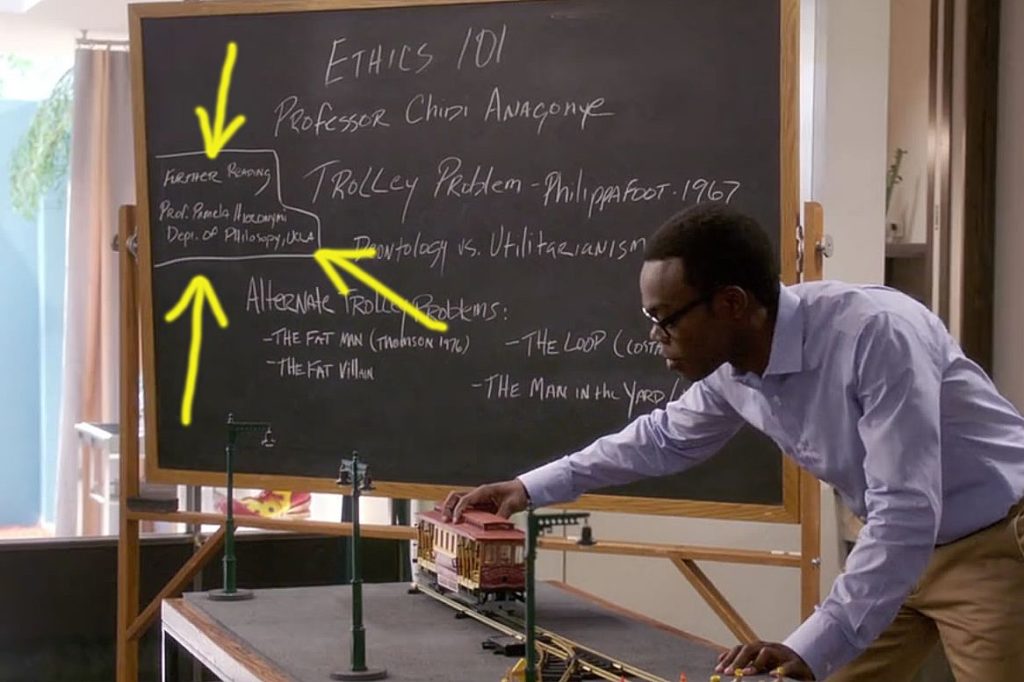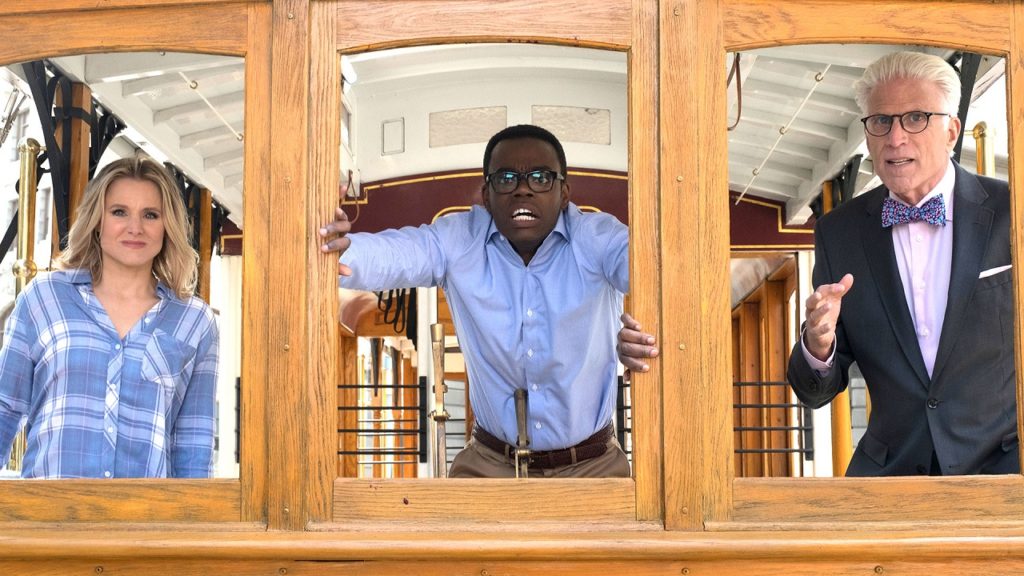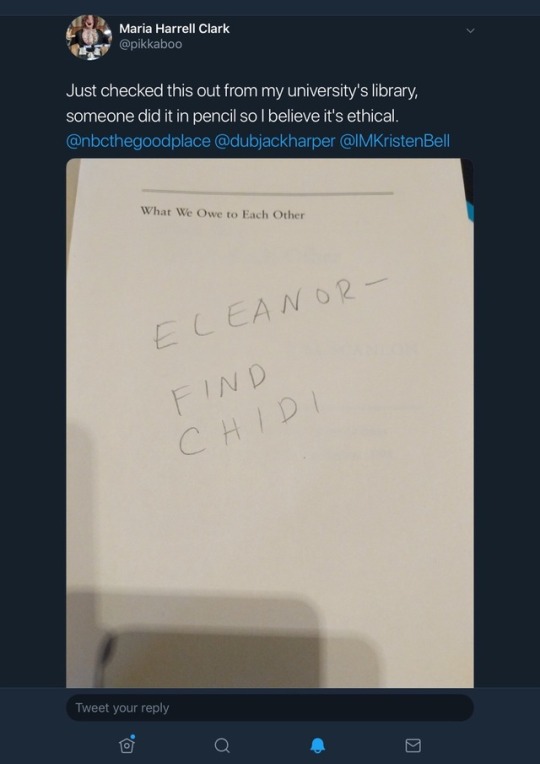A few weeks ago, The Good Class switched up its premise with a crazy Mike Schur visit, and during our last class meeting, we let that sit. But this week, we switched it up again(!) with a visit from Pamela Hieronymi, officially rounding out our Philosophy Trinity: Meghan, Chidi, Pamela. The Good Class got to know several important details about Professor Hieronymi including her favorite philosophy (contractualism) and her philosophical spirit animal (Dr. Peter Strawson). After an interesting warmup that concluded with two members of the Philosophy Trinity (not Chidi) discussing Derek Parfit’s wardrobe selection and the upshots of his separation of self theory (disjointed future self, teleporting, split brains, and other normal stuff), it was time to talk The Good Place.

Professor Hieronymi made it into an episode of The Good Place!
Professor Hieronymi explained her journey working on The Good Place. She received an email from Mike Schur about a year before the show started and agreed to meet with him, not realizing his work included the world’s favorite tv shows. They had a three-hour conversation about the show’s premise and about philosophy, and Pamela didn’t hear anything else for a year, until she saw a billboard for The Good Place’s premiere.
Professor Hieronymi returned for Season 2, this time talking with the entire writers’ room, including a lesson on the Trolley Problem.  She didn’t consult for Season 3, but she returned for Season 4 to provide suggestions about how blame leads to ethical power struggles. But since she never sees the final scripts, she claims to be just as clueless about the final season as the rest of us!
She didn’t consult for Season 3, but she returned for Season 4 to provide suggestions about how blame leads to ethical power struggles. But since she never sees the final scripts, she claims to be just as clueless about the final season as the rest of us!
She went on to describe the very serious, smart-brained approach taken by the writers’ room when presented with new philosophical topics. Although she states that Mike Schur was the only Good Place member to receive reading homework from her, Professor Hieronymi described the writers as very motivated students who learn best through applying theories to story. Since her profession often requires her to be an “abstract thinker” and “reader of obscure books,” Professor Hieronymi shared that she has found it very gratifying to share these important philosophical ideas through exciting stories.
Pamela spent lots of time discussing her own philosophical belief, contractualism, which is also championed by T.M. Scanlon, author of What We Owe to Each Other. Fun Fact: Scanlon was Professor Hieronymi’s dissertation advisor!

Contractualism has its basis as a political theory in Hobbes, Locke, and Rousseau’s ideas of the social contract. Philosophically, it is neutral on the “good life,” which makes it suitable for pluralist society. Contractualism aims for the minimum standards for living together respectfully and peacefully, pushes for compromise, and tries not to give special preference to any one interest, all with the goal of living in accordance with terms that no one could reasonably object.
Professor Hieronymi offered “free rider” problems as examples of contractualism. When we drive on the highway, we all understand that we must wait in line to exit; it’s an unspoken rule of the road. However, when someone drives up to the split and forces their way in, cutting the line, we get angry, not because we lost any real time, but because that person has broken the contract. (The Good Class has sent an email to the Good Place Accounting Department concerning how to quantify the amount of points lost by improperly merging in traffic, but has yet to hear back.)
Pamela also pointed to the presence of contractualism in The Good Place: the Soul Squad’s overall arc is learning to be better people and do more good because of their relationships. For example, in Season 3, when the Soul Squad has learned about the afterlife, terminating their point accrual and damning them to the Bad Place, they head out to help others get into the Good Place. They owe it to other people to help them since they still have a chance (well, theoretically, as we would discover by the end of Season 3).

Finally, Professor Hieronymi opened up about more of her philosophical takes. She is not so sure that the “fake it till you make it” method of repeating good acts is gonna cut it for someone to become a good person. She said there needs to be some sort of change in character, change of view or perspective, etc. According to Professor Hieronymi, repetition and philosophy can provide consistency, but one also needs empathy to be a good person, and repetition won’t necessarily give someone that.
She also offered her opinion on free will, which is that we have it, so we can totally dump iced tea on people. Next time your friend rants to your table in South Dining Hall about living in a causally determined world, really let ‘em have it!

We rate this Chapter…
Dancing Ability: Still no in-class dancing, but until that happens, I want you thinking about dance 24/7. That means every day, you think 20 thoughts about dance for 7 minutes.
Coolness: so cool that we didn’t hate the moral philosophy professor!!
Dopeness: we’re ALL on our way to dope souls and hella ethics
Freshness: 100% certified fresh (like Shrek 2 should be on Rotten Tomatoes)
Smart-brained: 8/13 (did that philo lesson have any ftt majors trippin??)
